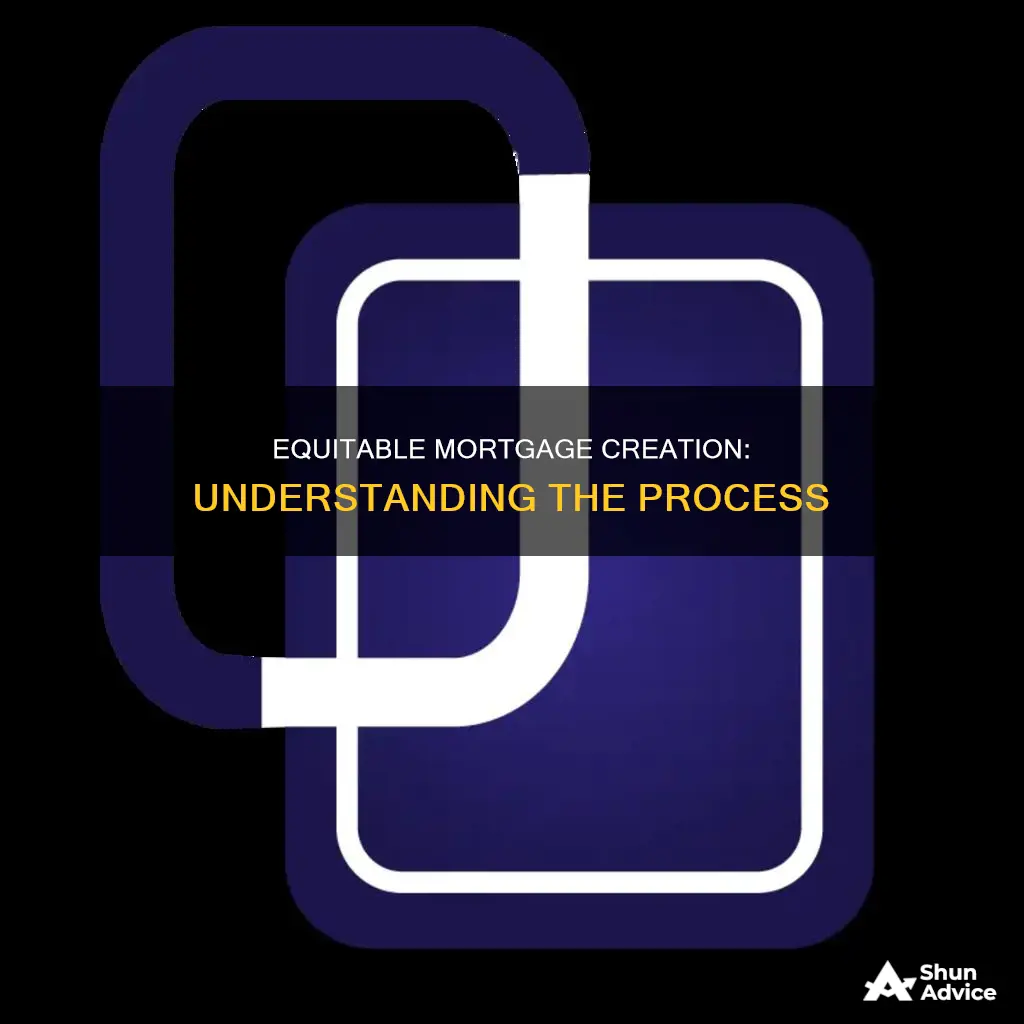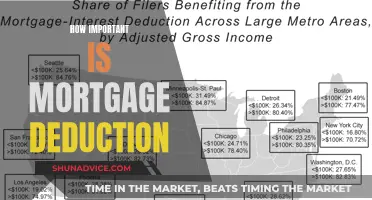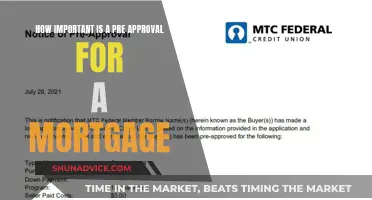
An equitable mortgage is a legal arrangement where a borrower offers their property as security for a loan without transferring ownership to the lender. This type of mortgage is created when the mortgagor has only an equitable interest in the land, and it can only be granted in writing. It is a temporary solution that offers flexibility and protection for both the borrower and the lender. Understanding how an equitable mortgage is created is crucial for making informed financial decisions and ensuring fair and legal property transactions.
| Characteristics | Values |
|---|---|
| Mortgagee's legal interest in the land | None |
| Mortgagor's interest in the land | Equitable |
| Mortgage deed | Not required |
| Mortgage contract | Must be in writing |
| Registration | Required by a government authority |
| Proof of loan | Mortgage deed |
| Enforcement | Lender has a legally enforceable claim to the property |
| Visibility | Public, potential buyers, and other interested parties |
| Risk | Higher for the lender |
| Common usage | Not standard, provides flexibility and a temporary solution |
What You'll Learn

The mortgagor has an equitable interest in the land
The concept of equitable interest in land is a cornerstone of property law, and it is important to understand how it applies to mortgagors and mortgagees. A mortgagor is an individual or entity that borrows money using real estate as collateral, while a mortgagee is the lender that provides the loan.
When a mortgagor has only an equitable interest in the land, they do not possess legal ownership of the property. Instead, they have a right to use, possess, or benefit from the property in a meaningful way. This equitable interest can arise in several scenarios. For example, a beneficiary under a trust of land holds an equitable interest without legal ownership. In this case, the trustee holds the legal title and manages the property, while the beneficiary has the equitable interest and benefits from its use or income. Similarly, in a joint tenancy, each co-owner has an equitable claim to the use and benefit of the entire property, even if they do not have direct legal ownership.
If a mortgagor with only equitable interest in the land wishes to obtain a mortgage, it can only be an equitable mortgage. This is because they cannot grant a legal interest in the land that they do not possess. An equitable mortgage does not provide the mortgagee with a legal interest in the land. Instead, the mortgagee holds an equitable interest, giving them the right to sell the property if the mortgagor fails to repay the loan. This type of arrangement provides flexibility and a temporary solution for borrowers who need immediate funds but cannot execute a formal mortgage deed immediately.
It is important to note that equitable mortgages carry a higher level of risk for lenders due to the absence of legal interest in the land. As a result, equitable mortgages are not as common as registered mortgages, which offer greater legal protection and a clearer path for property repossession in case of non-payment. Nonetheless, equitable mortgages serve as a safeguarded way for borrowers to obtain loans using their equitable interest in the property as collateral without giving up ownership.
The Mortgage Appraisal Process: How It's Done
You may want to see also

The mortgage is not made by deed
To create an equitable mortgage, a written document signed by both parties is required. This document outlines the terms of the mortgage, including the amount, interest rate, and repayment schedule. However, for a mortgage to be considered equitable, it does not necessarily have to be created by a deed. Here are some key points to consider in this regard:
Firstly, an equitable mortgage can be created through a simple written agreement between the mortgagor (borrower) and the mortgagee (lender). This agreement should clearly state the intention to create a mortgage and outline the terms and conditions governing the loan. The document should be signed by both parties and witnessed to ensure its enforceability.
Secondly, the distinguishing factor of an equitable mortgage is that it is not registered or recorded with any government or legal authority. It is a private arrangement between the parties involved and is typically based on trust and good faith. As a result, equitable mortgages are often used in situations where the parties have a close relationship or when the loan is of a temporary nature.
Thirdly, while the absence of a deed may suggest informality, equitable mortgages are still legally binding and enforceable. They are recognised by the law as valid agreements, provided that they meet the essential requirements of a contract, including offer, acceptance, consideration, and capacity to enter into a contract. Thus, proper drafting and execution of the agreement are crucial to protect the interests of both parties.
One of the critical aspects of an equitable mortgage is the delivery of possession of the property. In this type of arrangement, the mortgagor typically retains possession of the property, while the mortgagee gains equitable interest in it. This equitable interest serves as security for the loan and entitles the mortgagee to certain rights and remedies if the mortgagor defaults.
Finally, equitable mortgages offer flexibility in their structure and terms, allowing them to be tailored to the specific needs of the parties involved. However, it is always advisable to seek legal guidance when creating an equitable mortgage to ensure compliance with applicable laws and to fully understand the rights and obligations of both the mortgagor and the mortgagee.
Mortgages: Understanding the High Cost of $1800 Monthly Payments
You may want to see also

The charge by way of legal mortgage is not registered
An equitable mortgage is a legal arrangement where a borrower offers their property as security for a loan without transferring ownership to the lender. In this type of mortgage, the lender holds an equitable interest in the property, giving it the right to sell it if the borrower fails to repay the loan.
An equitable mortgage may arise if the mortgagor has only an equitable interest in the land, for example, if the mortgage is granted by a beneficiary under a trust of land. It can also arise if the mortgage is not made by deed, which is a requirement for legal mortgages. The contract for the mortgage must still be made in writing.
If a charge by way of legal mortgage of registered land is not entered onto the register, it takes effect in equity only (Land Registration Act 2002 s 27(1)). This means that the charge is not a registrable disposition and may only be protected by way of notice. An equitable chargee does not have all the rights that a legal chargee has, but they can go to court for an order for possession and sale if the borrower defaults.
The distinction between equitable mortgages and registered mortgages is significant in the world of property financing. Registered mortgages are the standard in property transactions, providing security and legal clarity for both borrowers and lenders. Equitable mortgages, on the other hand, offer flexibility and a temporary solution, often relying on informal agreements. However, they come with a higher level of risk and fewer legal protections for lenders.
Understanding Mortgage and Debt: Key Differences Explained
You may want to see also

The borrower offers their property as security for a loan
An equitable mortgage is a legal arrangement where a borrower offers their property as security for a loan without transferring ownership to the lender. In this type of mortgage, the lender holds an equitable interest in the property, giving them the right to sell it if the borrower fails to repay the loan. This type of mortgage is often used when a formal mortgage deed cannot be executed immediately, providing a temporary solution for borrowers who need funds while protecting the lender's interests in the property.
The borrower's property acts as collateral, which serves as a guarantee for the lender, ensuring they can recover their money if the borrower defaults on the loan. This reduces the risk of financial loss for the lender, who has a well-documented and legally enforceable claim to the property. The property offered as security may be the property that the loan is used to buy, or it may be another property, such as a parent offering their family home as security for their child's property purchase. The value of the property offered as security is assessed by a professional valuer, and this document is used to determine the approximate current value of the property, the loan size, and the loan-to-value ratio (LVR).
In addition to real property, lenders may also require personal property assets to be pledged as collateral. This could include business assets, especially if the borrower or an affiliate is operating a business at the property, as this can increase the value of the property. Other types of personal property that can be pledged as collateral include all ownership interests in the borrower or its affiliates, accounts receivable, and deposit accounts.
It is important to note that equitable mortgages differ from registered mortgages, which are the standard in property transactions. Registered mortgages are officially recorded with a government authority, creating a public record of the mortgage. While equitable mortgages offer flexibility and rely on informal agreements, they come with a higher level of risk and less legal protection for the lender.
Paying Off My Mortgage: Strategies for Faster Freedom
You may want to see also

The lender has a legally enforceable claim to the property
An equitable mortgage is a legal arrangement where a borrower offers their property as security for a loan without transferring ownership to the lender. In this type of mortgage, the lender holds an equitable interest in the property, giving them the right to sell it if the borrower fails to repay the loan. This means that, should the borrower default on their loan, the lender has a legally enforceable claim to the property.
Equitable mortgages are often used when a formal mortgage deed cannot be executed immediately, providing a temporary solution for borrowers who need funds while protecting the lender's interests in the property. This type of mortgage can be created in several ways, including when a mortgagor has only an equitable interest in the land, such as a beneficiary under a trust of land. In this case, the mortgagor can only grant an equitable mortgage, as they do not have a legal interest in the land.
Another way an equitable mortgage can be created is if the mortgage is not made by deed, which is a requirement for legal mortgages. In this case, the contract for the mortgage must still be made in writing. If a charge by way of a legal mortgage of registered land is not entered onto the register, it takes effect in equity only, as per the Land Registration Act 2002. This means that the lender's claim to the property is based on their equitable interest in the property rather than a legal interest.
It is important to note that equitable mortgages offer flexibility and a temporary solution but rely on informal agreements, which can increase the risk for lenders. A registered mortgage, where the arrangement is officially recorded with a government authority, provides greater security and legal clarity for both borrowers and lenders. However, equitable mortgages can be a lifeline for borrowers in financial need, allowing them to secure loans using their property as collateral without giving up ownership.
Understanding Conversion Mortgage Repayment: What You Need to Know
You may want to see also
Frequently asked questions
An equitable mortgage is a legal arrangement where a borrower offers their property as security for a loan without transferring ownership to the lender.
In a legal mortgage, the assets are conveyed to the secured party, but are subject to a right to have the assets returned when certain things are performed, like paying off the amount owing. An equitable mortgage exists where there is no legally registered interest.
An equitable mortgage allows borrowers to secure loans using their property as collateral without giving up ownership. This can be a lifeline during financial need.
An equitable mortgage ensures that lenders have a legal claim to the property if the borrower defaults, reducing the risk of losing their investment.
An equitable mortgage can be created in a number of ways. Firstly, an equitable mortgage can occur as a legal mortgage that was never perfected by conveying the underlying assets, for example, if there was a mistake on the transfer deed. Secondly, an equitable mortgage will arise if the mortgage is not made by deed (a requirement for legal mortgages). The contract for the mortgage must nevertheless be made in writing.







